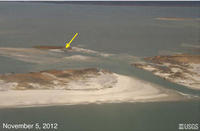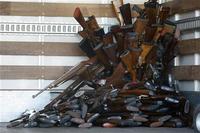-
Active-shooter training programs for local law enforcement
Active-shooter training sessions have been in high demand as law enforcement agencies have increased the attention they pay school security after the Sandy Hook Elementary mass shooting. More than twenty-four officers from various northern California law enforcement agencies participated in a two-day active shooter training course funded by DHS.
-
-
Uranium mining debate divides Virginia
In Virginia a fight has begun over whether to drill for uranium. Some feel the drilling, which would create about 1,000 jobs and bounty of tax revenue in addition to nuclear fuel, is important for a state whose main industries, such as tobacco and textiles, are failing. Those who oppose the drilling fear the contamination of drinking water in case of an accident, and a stigma from uranium which would deter people and businesses from moving to the area.
-
-
More states move to restrict access to personal information of gun holders
Currently, thirty-five states do not provide access to information on people who have gun licenses, except to law enforcement. Some of the states where access to such information is permitted, are now moving toward restricting such access.
-
-
Minnesota counties police make big money from drug seizures
In 2011, law enforcement in southern Minnesota made a significant profit off crime busts. State Auditor Rebecca Otto released the Criminal Forfeitures Report last month, which offers information on the amount of cash and property seized by Minnesota law enforcement agencies.
-
-
Police officers in Louisiana do not have to look for a ride home
Tighter budgets have had an effect on police departments everywhere. In Indianapolis, Indiana, and many other cities, police departments now charge officers a fee to take home their squad cars. Police departments in central Louisiana resist this trend. “This [taking home a squad car] is not a privilege,” says the director of the National Fraternal Order of Police. “It really is about maximizing response times and the ability of officers to be where they need to be.”
-
-
New York State votes for strict gun law
New York governor Andrew Cuomo yesterday signed into law a sweeping gun-control bill. The bill expands a ban on assault weapons, limits the size of magazines, includes measures to keep guns away from the mentally ill, and make penalties stiffer for using a gun in the commission of a crime. Cuomo signed the bill shortly after the State Assembly approved it by a 104-43 vote on the second day of the 2013 legislative session.
-
-
New York to make state’s strict gun laws even stricter
New York State is nearing an agreement on a proposal to put some of the toughest gun-control laws into effect. The laws include expanding the definition of banned assault weapons, limiting magazines to seven rounds, and requiring background checks on people who buy ammunition
-
-
Shoring up Long Island’s natural shore defenses against future storms

Sand and other coarse-grained sediments are vital to the naturally occurring barrier systems which dissipate storm surges, protect coastal residences, and shelter biologically diverse estuaries and ecosystems; a team of researchers is conducting marine geophysical surveys of the seafloor and shallow subsurface to assess the health of the offshore barrier system which protects the New York Harbor and southwestern Long Island region against damage from future storms
-
-
New York State power plants showing their age

New York State could face power plant closings in the near future as a result of updated environmental regulations and the fact that plants in the state are outdated and inefficient; a recent report concluded that New York’s coal and nuclear power plants, as well as steam and turbine plants that run on oil or gas, are on average older than others around the country
-
-
Privately funded gun buy-back programs proliferate

In the aftermath of the Connecticut mass shooting, private donors have donated hundreds of thousands of dollars to cities around the United States to fund gun buy-back programs; thousands of guns – and two rocket launchers – have been collected, but the impact on a gun-saturated society is likely to be small: this year alone the FBI has recorded 16.8 million instant background checks of gun buyers, 400,000 more than last year, which was a record year
-
-
Gun training for teachers gaining in popularity
Two hundred teachers in Utah are set to receive special firearms training — with a plastic gun — in order to carry concealed weapons in their classrooms in the future; in the aftermath of the mass shooting in the Sandy Hook Elementary School in Connecticut, gun training and gun safety classes for teachers are drawing attention
-
-
Proliferation of license plate readers worry privacy advocates
Automated License Plate Recognition (ALPR) technology has taken off in recent years, and the police says it is the greatest innovation since fingerprints and DNA; the technology has changed the way police finds cars connected to crimes, but in the process it has upset many privacy advocates
-
-
Fiscal cliff discussions get in way of post-Sandy relief measure
The post-Sandy rebuilding effort in the northeast has been stalled by the debate going on in Congress about a solution to the national debt
-
-
Louisiana parishes to encrypt police radio communication
First-responder agencies in Orleans, Jefferson, St. Bernard, and Plaquemines parishes in Louisiana will soon be encrypting all emergency radios, keeping emergency response chatter out of the ears of the public; the police says the encrypted communication is needed in order to keep criminals from gaining information on police by listening to scanners, but a police union and crime-prevention groups are worried that the encrypted system would prevent the media from monitoring police activity, and hobble neighborhood watch organizations from keeping their neighborhoods safe
-
-
In Oklahoma, even rumors of threat of school violence are taken seriously, and investigated
Threats of violence in schools must be taken seriously, even if the threats are nothing more than rumors; in Tulsa, Oklahoma, police and school officials take every threat seriously, even if it is nothing more than gossip
-
More headlines
The long view
States Rush to Combat AI Threat to Elections
This year’s presidential election will be the first since generative AI became widely available. That’s raising fears that millions of voters could be deceived by a barrage of political deepfakes. Congress has done little to address the issue, but states are moving aggressively to respond — though questions remain about how effective any new measures to combat AI-created disinformation will be.
